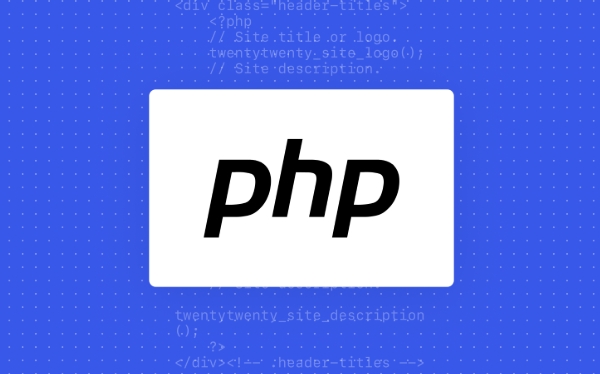内存管理和PHP数据类型:绩效视角
PHP的内存管理基于引用计数和周期回收,不同数据类型对性能和内存消耗有显着影响:1. 整数和浮点数内存占用小、操作最快,应优先用于数值运算;2. 字符串采用写时复制机制,但大字符串或频繁拼接会引发性能问题,宜用implode优化;3. 数组内存开销大,尤其是大型或嵌套数组,应使用生成器处理大数据集并及时释放变量;4. 对象传递为引用方式,实例化和属性访问较慢,适用于需要行为封装的场景;5. 资源类型需手动释放,否则可能导致系统级泄漏。为提升性能,应合理选择数据类型、及时释放内存、避免全局变量存储大数据,并结合memory_get_usage和opcache进行监控与优化,从而有效控制内存使用并提升执行效率。

When working with PHP—especially in performance-critical applications like large-scale web systems or long-running scripts—understanding how memory management interacts with PHP data types is crucial. While PHP abstracts much of the low-level complexity, inefficient use of data types can lead to bloated memory usage, slower execution, and scalability issues.

Let's break down how PHP manages memory and how different data types impact performance.
How PHP Manages Memory
PHP uses a reference-counting garbage collector (with a cycle collector added in PHP 5.3 ) to manage memory. Each variable in PHP is stored as a zval (Zend value) structure, which contains:

- The variable's value
- Its type
- A reference count
- Other metadata (like if it's a reference or not)
When a variable is created, PHP allocates memory for the zval . When the variable goes out of scope or is unset, the reference count drops. If it reaches zero, the memory is freed immediately. However, circular references (eg, objects referencing each other) can prevent cleanup, which is why PHP also runs a cycle detection process periodically.
Memory usage isn't just about how many variables you create—it's also about how they're copied, shared, and modified.

PHP Data Types and Their Memory Impact
Different data types have different memory footprints and behaviors under the hood. Here's a breakdown of common types from a performance and memory standpoint.
1. Integers and Floats (Scalars)
- Memory : ~8 bytes for integers on 64-bit systems (can vary), ~8 bytes for floats (double precision).
- Behavior : Passed by value. No reference counting overhead.
- Performance : Fastest to work with. Minimal memory footprint.
? Tip : Use integers instead of strings for IDs, counters, or loop indices. Avoid unnecessary type juggling (eg, using a string '123' in math operations).
2. Strings
- Memory : Variable size. PHP stores the string length and encoding info. Internally, each character in a regular string is 1 byte (ASCII), but UTF-8 multibyte chars take more.
- Copy Behavior : Copy-on-write. Multiple variables can share the same string until one is modified.
- Performance Risk : Large strings (eg, file contents, JSON blobs) can consume significant memory. Concatenating strings in loops (eg,
$str .= "x";) can be slow due to repeated reallocation.
✅ Better approach :
$parts = [];
for ($i = 0; $i < 1000; $i ) {
$parts[] = "item$i";
}
$result = implode('', $parts); // Much faster3. Arrays (Especially Large or Nested Ones)
- Memory : High. An empty array takes ~72 bytes. Each key-value pair adds overhead (~70 bytes per entry).
- Internals : PHP arrays are ordered hash maps (not C-style arrays), so they're flexible but memory-heavy.
- Copy-on-write : Arrays are copied only when modified after assignment.
❌ Memory trap :
$data = range(1, 100000); // 100k integers – uses ~8MB $copy = $data; // No immediate memory duplication (COW) $copy[] = 'extra'; // Now a full copy is made – spikes memory
? Optimization tips :
- Use generators instead of large arrays when processing data streams.
- Unset large arrays when done:
unset($data); - Prefer
foreachoverforwithcount()in loops (avoid repeated function calls).
4. Objects
- Memory : Higher than arrays. Each object has overhead (class info, property table, etc.).
- Passing : Always by handle (like a reference), so copying an object variable doesn't duplicate data.
- Performance : Object instantiation is slower than array creation. Property access is slightly slower than array access.
✅ Use objects when you need encapsulation and behavior, not just data storage.
5. Resources
- Memory : Small
zval, but points to external system resources (DB connections, file handles). - Management : Not cleaned by reference counting alone—must be explicitly closed (eg,
fclose()). - Risk : Leaking resources (eg, open database connections) can exhaust system limits even if PHP memory looks fine.
Practical Tips for Memory-Efficient PHP
To optimize performance from a memory perspective:
- ✅ Use appropriate types : Don't store numbers as strings. Avoid JSON-encoded arrays when native arrays suffice.
- ✅ Process data in chunks : Use generators (
yield) for large datasets. - ✅ Unset large variables early : Free memory when you're done with big arrays or strings.
- ✅ Avoid global or static variables holding large data : They persist across requests in SAPIs like PHP-FPM.
- ✅ Profile memory usage :
echo memory_get_usage() . " bytes\n"; echo memory_get_peak_usage() . " bytes\n";
- ✅ Enable opcache : Reduces memory and improves execution speed by caching compiled scripts.
Summary
PHP's memory management works well for typical web requests, but inefficiencies in data type usage can quickly add up—especially in long-running scripts or high-traffic apps. Scalars are cheap, strings and arrays are flexible but costly at scale, and objects add structure at a performance cost.
By choosing the right data types, avoiding unnecessary copies, and being mindful of scope and lifecycle, you can significantly reduce memory bloat and improve performance.
It's not about avoiding powerful features—it's about using them wisely.
以上是内存管理和PHP数据类型:绩效视角的详细内容。更多信息请关注PHP中文网其他相关文章!

热AI工具

Undress AI Tool
免费脱衣服图片

Undresser.AI Undress
人工智能驱动的应用程序,用于创建逼真的裸体照片

AI Clothes Remover
用于从照片中去除衣服的在线人工智能工具。

Clothoff.io
AI脱衣机

Video Face Swap
使用我们完全免费的人工智能换脸工具轻松在任何视频中换脸!

热门文章

热工具

记事本++7.3.1
好用且免费的代码编辑器

SublimeText3汉化版
中文版,非常好用

禅工作室 13.0.1
功能强大的PHP集成开发环境

Dreamweaver CS6
视觉化网页开发工具

SublimeText3 Mac版
神级代码编辑软件(SublimeText3)
 使用PHP 8的工会类型对您的代码库进行现代化现代化
Jul 27, 2025 am 04:33 AM
使用PHP 8的工会类型对您的代码库进行现代化现代化
Jul 27, 2025 am 04:33 AM
UpgradePHP7.xcodebasestoPHP8 byreplacingPHPDoc-suggestedtypeslike@paramstring|intwithnativeuniontypessuchasstring|intforparametersandreturntypes,whichimprovestypesafetyandclarity;2.Applyuniontypestomixedinputparameters(e.g.,int|stringforIDs),nullable
 PHP 8.1枚举:一种新型类型安全常数的范式
Jul 28, 2025 am 04:43 AM
PHP 8.1枚举:一种新型类型安全常数的范式
Jul 28, 2025 am 04:43 AM
PHP8.1引入的Enums提供了类型安全的常量集合,解决了魔法值问题;1.使用enum定义固定常量,如Status::Draft,确保只有预定义值可用;2.通过BackedEnums将枚举绑定到字符串或整数,支持from()和tryFrom()在标量与枚举间转换;3.枚举可定义方法和行为,如color()和isEditable(),增强业务逻辑封装;4.适用于状态、配置等静态场景,不适用于动态数据;5.可实现UnitEnum或BackedEnum接口进行类型约束,提升代码健壮性和IDE支持,是
 精度的危险:处理PHP中的浮点数
Jul 26, 2025 am 09:41 AM
精度的危险:处理PHP中的浮点数
Jul 26, 2025 am 09:41 AM
0.1 0.2!==0.3inPHPduetobinaryfloating-pointprecisionlimitations,sodevelopersmustavoiddirectcomparisonsanduseepsilon-basedchecks,employBCMathorGMPforexactarithmetic,storecurrencyinintegerswhenpossible,formatoutputcarefully,andneverrelyonfloatprecision
 PHP的二元性:导航松散键入与严格类型声明
Jul 26, 2025 am 09:42 AM
PHP的二元性:导航松散键入与严格类型声明
Jul 26, 2025 am 09:42 AM
PHP支持松散类型和严格类型并存,这是其从脚本语言演进为现代编程语言的核心特征。1.松散类型适合快速原型开发、处理动态用户输入或对接外部API,但存在类型隐式转换风险、调试困难和工具支持弱的问题。2.严格类型通过declare(strict_types=1)启用,可提前发现错误、提升代码可读性和IDE支持,适用于核心业务逻辑、团队协作和对数据完整性要求高的场景。3.实际开发中应混合使用:默认启用严格类型,仅在必要时在输入边界使用松散类型,并尽早进行验证和类型转换。4.推荐实践包括使用PHPSta
 了解``callable''伪型及其实施
Jul 27, 2025 am 04:29 AM
了解``callable''伪型及其实施
Jul 27, 2025 am 04:29 AM
AcalableInphpiSapseDo-typerepresentingyanyvaluethatcanbeinvokedusedthuse()operator,pryperally formimallyforflefflexiblecodeiCodeIncallbackSandHigher-rorderfunctions; themainformsofcallablesare:1)命名functionslunctionsLikefunctionsLikeLike'strlen',2)andormousfunctions(2)andonymousfunctions(封闭),3),3),3),3)
 从'混合到`void':php返回类型声明的实用指南
Jul 27, 2025 am 12:11 AM
从'混合到`void':php返回类型声明的实用指南
Jul 27, 2025 am 12:11 AM
returnTypesinphpimProveCoderEliabilitialaryandClarityBysPecifying whatafunctionMustReturn.2.UseBasictyPesLikestring,array,ordatimetoetoEnforCorrectRecturcrectRecturnValuesUnturnvAluesAndCatchErrorSearly.3.applynullabletypespeswith?applynullabletypeswith?
 变量的寿命:PHP的内部' Zval”结构解释了
Jul 27, 2025 am 03:47 AM
变量的寿命:PHP的内部' Zval”结构解释了
Jul 27, 2025 am 03:47 AM
PHP使用zval结构管理变量,答案是:1.zval包含值、类型和元数据,大小为16字节;2.类型变化时只需更新联合体和类型信息;3.复杂类型通过指针引用带引用计数的结构;4.赋值时采用写时复制优化内存;5.引用使变量共享同一zval;6.循环引用由专门的垃圾回收器处理。这解释了PHP变量行为的底层机制。
 PHP中的资源管理:'资源”类型的生命周期
Jul 27, 2025 am 04:30 AM
PHP中的资源管理:'资源”类型的生命周期
Jul 27, 2025 am 04:30 AM
PHP资源的生命周期分为三个阶段:1.资源创建,通过fopen、curl_init等函数获取外部系统句柄;2.资源使用,将资源传递给相关函数进行操作,PHP通过资源ID映射到底层系统结构;3.资源销毁,应优先手动调用fclose、curl_close等函数释放资源,避免依赖自动垃圾回收,以防文件描述符耗尽。最佳实践包括:始终显式关闭资源、使用try...finally确保清理、优先选用支持__destruct的PDO等对象封装、避免全局存储资源,并可通过get_resources()监控活动资源







